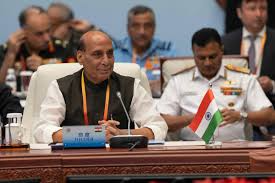‘Some countries use cross-border terrorism as instrument of policy… shelter terrorists’: Rajnath Singh at SCO meet

During the SCO Defence Ministers’ meeting in Qingdao, China, on June 26, 2025, India’s Defence Minister Rajnath Singh issued a strong message. He stated that some nations still use terrorism as a tool of foreign policy. Without naming Pakistan, he accused countries of shielding terrorists and supporting cross-border terrorism. His speech highlighted India’s firm resolve against terror threats and safe havens.
India’s Tough Stand on Terrorism
Rajnath Singh made it clear: “Terror epicentres are no longer safe. India will act if provoked.” He called for strong, united global action to end terrorism in every form. India has long accused Pakistan of supporting terror groups, and Singh’s comments reflect continued frustration. His remarks also signal India’s growing willingness to act proactively, not just defensively.
India Refuses to Sign SCO Statement
In a bold diplomatic step, India chose not to sign the final joint statement issued by the SCO. The reason? The document avoided directly naming terror groups or state sponsors. Singh said that such vagueness only encourages impunity. India believes declarations on terrorism must include clear language and accountability.
This move shows India’s growing assertiveness. It won’t support agreements that ignore state-sponsored terror. It also signals a shift in India’s multilateral strategy — one based on principles, not convenience.
Operation Sindoor: Still Active
Rajnath Singh confirmed that Operation Sindoor is still ongoing. This covert mission reportedly targets terror groups operating in Pakistan and Pakistan-occupied Kashmir. Though details remain classified, it likely includes drone surveillance, intelligence operations, and surgical strikes.
By referencing the operation, Singh warned terror sponsors: future attacks will meet swift, targeted responses. India will no longer tolerate prolonged inaction or indirect threats.
Time for Collective Global Action
Singh also urged SCO nations to act together. He stressed that radical ideologies and terrorism do not respect borders. These threats need unified, cross-border solutions.
He highlighted growing risks — like drone-based strikes and encrypted communications. Terror groups are now more tech-savvy. Governments must share intelligence and tighten cyber defences to stop them early. Singh’s message: no country can fight terror alone anymore.
No Room for Double Standards
India has often criticized the world’s selective approach to terrorism. Singh said that “terrorists are terrorists”, and the world must stop differentiating between “good” and “bad” terrorists. This pointed statement challenges both China and Pakistan. India believes shielding certain groups only fuels long-term instability.
National Security Adviser Ajit Doval echoed this view earlier in the week. He urged SCO nations to take a single, firm position on terrorism — one that doesn’t shift based on strategic interests.
Rising Tensions Within the SCO?
India’s refusal to endorse the SCO declaration may strain ties within the bloc. Pakistan and China’s reluctance to address terrorism clearly has widened existing rifts. India’s stance contrasts sharply with the softer positions taken by some SCO members.
At the same time, India enjoys support from Russia and several Central Asian countries. They share its concerns about rising extremism and regional instability. India is also aligning more closely with global coalitions like the Quad on counter-terror issues.
India’s Next Steps
India’s message is clear. It will not compromise on its national security or remain silent on terrorism. The country plans to:
- Strengthen intelligence and border operations.
- Increase counter-terror partnerships with allies.
- Push for better international laws to curb terror funding.
- Conduct pre-emptive strikes if needed.
India’s strategy now rests on deterrence and accountability. It is moving away from reactionary responses to a more proactive security approach.
Conclusion
Rajnath Singh’s remarks at the SCO meeting mark a clear turning point. India is no longer willing to overlook weak declarations or soft diplomacy on terrorism. It seeks strong, clear, and united global responses — not half-measures or political evasions.
By refusing to sign the SCO declaration and warning terror sponsors directly, India has taken a bold stand. The world must now decide whether it wants real action on terrorism — or more of the same silence.






